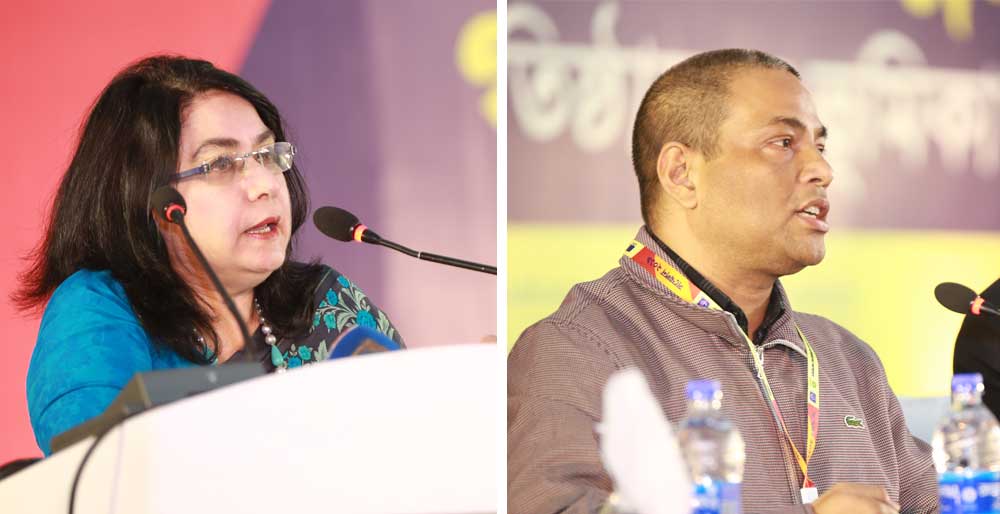
Enhancing accountability and widened space for citizen’s participation in the delivery process of the public services are vital to realise the Sustainable Development Goals (SDGs) in Bangladesh. A number of communities across the country are lagging behind due to critical challenges to exercise the rights of access to public services. Government needs to focus on strengthening coordination among local authorities and improving appreciation among local communities about public services to ensure smooth implementation of national policies at local level.
Presentations: 1. Education 2. Health 3. Safe Water 4. VGD 5. Agriculture
Citizen’s Charter
Video: Kick-off Session | Parallel Session: 1. Agriculture and VGD 2. Health and WASH 3. Education | Debriefing Session | Closing Session
These recommendations emerged today 18 December 2019 from a national conference titled “Democratic Governance and Development: Role of Grassroots Citizens Organisations” organised at a convention centre in Dhaka.

The event was organised jointly by Centre for Policy Dialogue (CPD) and Oxfam in Bangladesh as part of an ongoing project titled ‘Enhancing the participation of community-based organizations (CBOs) and civil society organizations (CSOs) in democratic governance in Bangladesh’, funded by the European Union in Bangladesh. The event was organised in association with the Citizen’s Platform for SDGs, Bangladesh.

Local citizens of 13 districts examined quality of public service delivery in the areas of agriculture, vulnerable group development, education, health and water and sanitation. Based on these social audit reports, a citizen’s charter has been adopted at the conference where the observations and aspirations of grassroots citizens related public services were reflected.

Mr Saber Hossain Chowdhury, MP, Chairman, Parliamentary Standing Committee on Ministry of Environment, Forest and Climate Change and Honorary President, Inter-Parliamentary Union (IPU), spoke as a Special Guest at the Closing Plenary of the event. He observed that the government is committed to ensuring sustainable development. However, he also emphasised that to develop the country all stakeholders must be engaged. He considered the submissions of the conference critical for the parliamentary committees.
Mr Chowdhury pledged that he will take the observations and recommendations of the citizen charter presented in the conference to the parliamentary discussions. He emphasised that, the government will continue to take necessary steps to ensure transparency and accountability in the delivery of public services and implementation of national development policies at all levels from national to grassroots.

Mr Hafiz Ahmed Mazumder, MP, Chairman, Parliamentary Standing Committee on Ministry of Planning, present at the Closing Plenary of the event as Special Guest, said that, it is important to raise awareness and participation of local people in implementing development policies at the local level. To do so, the local public representatives will have to play an effective role.

Dr Debapriya Bhattacharya, Distinguished Fellow, CPD and Convenor of Citizen’s Platform for SDGs, Bangladesh, chaired the closing session of the conference. He said that the pledge of the SDGs is to leave no one behind from the development process. It is a must to ensure that the voices of marginalised people of hard-to-reach areas of the country are heard and reflected in the national development policies.

H E Ms Rensje Teerink, Ambassador and Head of Delegation, Delegation of the European Union to Bangladesh, and Professor Rehman Sobhan, Chairman, CPD, were present at the Closing Plenary of the event as Guests of Honour.

Dr Dipankar Datta, Country Director of Oxfam in Bangladesh and Dr Fahmida Khatun, Executive Director of CPD, delivered welcome remarks at the event.

The event was designed to discuss and analyse the dynamics and challenges in terms of delivering public services related to agriculture, VGD, health, WASH and education. The day-long event was participated by around 650 participants from across the country including representatives from hard-to-reach communities, officials from local government and administrators, development practitioners, social activists, international development partners among others.


